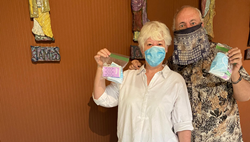[ad_1]

“It is inspirational to see the ways that partners like the Diocese of West Texas are addressing this complex humanitarian crisis by building coalitions of support from volunteer translators to governmental and non-governmental agencies,” said Tamara Plummer, Episcopal Relief & Development.
NEW YORK (PRWEB)
May 04, 2021
Episcopal Relief & Development is supporting the Episcopal Diocese of West Texas as it provides COVID-safe humanitarian assistance, such as transportation, food and medical care, to people seeking asylum in south Texas.
“It is inspirational to see the ways that partners like the Diocese of West Texas are addressing this complex humanitarian crisis by building coalitions of support from volunteer translators to governmental and non-governmental agencies,” said Tamara Plummer, Program Officer, US Disaster Program at Episcopal Relief & Development. “By utilizing strong safety protocols, the migration ministry is able to continue and our baptismal covenant is put into practice.”
The Immigration Ministries of the Diocese of West Texas (IM DWTX) works with individuals and families seeking asylum at the US border. As part of the Interfaith Welcome Coalition in San Antonio, diocesan volunteers and staff greet travelers and provide transportation to assist them on the journey to their sponsor. Using the Episcopal Asset Map, a tool created by The Episcopal Church and Episcopal Relief & Development, Flor Saldivar, Coordinator for Immigration and Refugee Ministries for IM DWTX, is coordinating transportation routes by identifying which congregations would be able to provide assistance.
In addition to transportation, the diocese is providing translation services, medical care, food, hygiene items and baby and maternity supplies to individuals and families in need. IM DWTX and other local organizations are collaborating with local and federal governments to make the COVID-19 vaccine readily available to migrants who choose to take it. Volunteers and staff follow strict COVID-19 prevention guidelines such as wearing masks and limiting the number of unrelated people who can ride together.
“The more information congregations share on the Episcopal Asset Map about their gifts, the easier it is for disaster response coordinators to mobilize resources to respond to human need and the work being done at the border is a perfect example,” continued Plummer.
Please consider a donation to Episcopal Relief & Development’s US Disaster Response Fund to support the organization’s continued assistance to vulnerable communities impacted by disasters, both natural and human-made.
ABOUT EPISCOPAL RELIEF & DEVELOPMENT:
For 80 years, Episcopal Relief & Development has been working together with supporters and partners for lasting change around the world. Each year the organization facilitates healthier, more fulfilling lives for more than 3 million people struggling with hunger, poverty, disaster and disease. Inspired by Jesus’ words in Matthew 25, Episcopal Relief & Development leverages the expertise and resources of Anglican and other partners to deliver measurable and sustainable change in three signature program areas: Women, Children and Climate.
Photo Courtesy of the Episcopal Diocese of West Texas
Share article on social media or email:
[ad_2]

